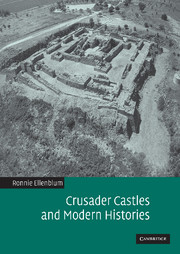Book contents
- Frontmatter
- Contents
- List of illustrations
- List of tables
- Acknowledgements
- Part I National discourse and the study of the Crusades
- 1 From moral failure to a source of pride
- 2 The narrative of the Crusades and the nationalist discourse
- 3 Nationalist discourse and Crusader archaeology
- Part II Crusader studies between colonialist and post-colonialist discourse
- Part III Geography of fear and the spatial distribution of Frankish castles
- Part IV The castle as dialogue between siege tactics and defence strategy
- Conclusion
- Appendix
- Bibliography
- Author index
- Subject index
1 - From moral failure to a source of pride
Published online by Cambridge University Press: 29 July 2009
- Frontmatter
- Contents
- List of illustrations
- List of tables
- Acknowledgements
- Part I National discourse and the study of the Crusades
- 1 From moral failure to a source of pride
- 2 The narrative of the Crusades and the nationalist discourse
- 3 Nationalist discourse and Crusader archaeology
- Part II Crusader studies between colonialist and post-colonialist discourse
- Part III Geography of fear and the spatial distribution of Frankish castles
- Part IV The castle as dialogue between siege tactics and defence strategy
- Conclusion
- Appendix
- Bibliography
- Author index
- Subject index
Summary
On 11 April 1806, the Classe d'Histoire et de Littérature Ancienne of the Académie Française announced the subject for its annual historical competition. The participants were asked to ‘Examine the effects which the Crusades had on the civil liberties of the peoples of Europe, on their civilisation, and on their progress towards enlightenment, commerce, and industry’. In other words, in 1806 the French Academy called for a reassessment of the Crusades in the light of the ideas of the French Revolution. The two prize-winners, announced on 1 July 1808, were Maxime de Choiseul-Daillecourt, a 26-year-old Frenchman, and Arnold Hermann Ludwig Heeren, a professor of history at the University of Göttingen. The manuscript submitted by the third candidate, Jan Hendrik Regenbogen, who would later become a professor of theology in Leiden, was lost in the mail.
All three essays were true to the dictated guidelines and all of them portrayed the positive influence of the Crusades on Western civilisation as being all-inclusive and discernible in almost every cultural and material aspect of human life. They succeeded in tracing the positive influence of the Crusades even in such unexpected areas as the status of the peasantry, land ownership, development of the feudal system, court life, abolition of the duel as an instrument of justice, ascendancy of papal power, fine arts, geography, history, mathematics, astronomy, languages, poetry, and music.
- Type
- Chapter
- Information
- Crusader Castles and Modern Histories , pp. 3 - 17Publisher: Cambridge University PressPrint publication year: 2007



